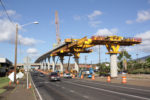CHAIR’S 3 MINUTES
Published in the Maui News, September 3, 2017
By: Mike White
This past week was spent at the state Legislature in a final effort to keep the Neighbor Islands from being dragged into Honolulu’s controversial rail project.
As of this column’s deadline, it appears that despite our best efforts, the transient accommodations tax will be raised by 1 percent statewide to help pay for rail.
It simply is unreasonable that legislators chose this option when a clear alternative was available — simply extending Honolulu’s general excise tax surcharge.
Now that the Legislature has decided that rail is a statewide issue, how will Neighbor Islands have oversight over funds generated from our county? The rail is a project of the City and County of Honolulu, not the State of Hawaii. With state projects, Neighbor Islands at least have input on projects statewide either through legislators or boards and commissions with Neighbor Island representation.
In this case, there will be no shared oversight other than the City and County of Honolulu. The Legislature attempted to add ex-officio members on the rail board, but this still requires approval from Oahu voters. As a result, many in the community have serious concerns with this new setup.
Appreciation must be shown to the Neighbor Island and Oahu legislators who voted “no” on this proposal. However, Neighbor Island legislators were not unanimous and I encourage you, if your legislators supported this measure, to ask them why.
Once the governor signs off, the Neighbor Islands will watch an additional $30 million from our economies go straight to Oahu instead of staying in our communities for local businesses and employees.
The Legislature could have explored all TAT taxing options before increasing rates. This includes law changes to ensure collection of TAT from accommodation remarketers instead of just operators. I am working on a bill to correct this problem, and will be asking for it to be included in the Hawaii State Association of Counties legislative package. The potential increase in revenues will range from $60 million to $80 million.
The outcome at the Legislature is indeed frustrating and serves as a good example why many residents lose faith in government. Unlike county councils, boards and commissions, the Legislature does not have to follow any open government laws.
Many times, their decisions are made in leadership meetings or in caucus behind closed doors. Members do not need to explain their votes in public or hold public debates.
This is in stark contrast to hearings at county council meetings throughout the state. All deliberations and decision-making must be made in public. Agendas must be posted at least six days in advance and only posted items may be discussed. The Legislature oftentimes only must give a 48-hour notice and has wide latitude for discussions.
No more than two council members can interact or discuss council business at any one time and no commitment to vote can be made outside of an open session.
I believe the way the county councils operate is the right way. For council members it can be frustrating at times, but it protects the public’s right to know.
All that I ask is that the state Legislature follow the same rules that it requires boards, commissions and county councils to operate under. It is only fair and this most recent special session is an example of why this is necessary and appropriate.
Legislation was introduced and decided upon even before any type of public hearing or an official calling of a special session. No amendments to the bill were considered or offered. I agree with the many other county leaders who stated that the community deserved a better bill.






